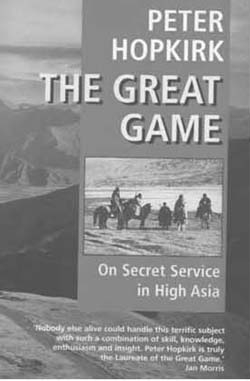It is now twenty-five years since Peter Hopkirk’s book was published, the great game between Imperial Russia and Great Britain in Central Asia that he celebrated is forgotten, as dated as marbles in an age of video games, but it remains worth reading, not just because it is beautifully written, but because it still raises questions, sets off trains of thought, and goads the reader to explore the issues he writes about. Few books do this, and those that do age well.
For an Indian, accustomed to seeing his government sulking in its tent because a neighbour acts against its interests, the book reminds us that great powers assume others will be inimical, prepare themselves accordingly, and try to head off threats through a sustained engagement with the perceived enemy, making it clear where accommodation can be reached, what is unacceptable, and laying down red lines that the antagonist recognizes as dangerous to cross. Throughout the great game, while Russian and British officers and agents fenced and diced in the mountains and plateaus of Central Asia, the two governments were in continuous dialogue in London and Moscow. The British made it clear in this dialogue when the Russian military, as ambitious and hot-headed as the Pakistan Army, were approaching the limits of their patience, forcing the Tsar, repeatedly, to back off. There is a lesson in this for us.
Used as we now are to the hierarchy of power and responsibility, it is also a shock to be reminded how young the men who played this dangerous game were. Most were in their twenties when they made their name, braving dangers that few civil servants or soldiers now do, except in war. They also were given, or assumed, responsibilities that their modern-day successors can only dream of at the same stage of their careers, parlaying with potentates, wheeling and dealing with tribal chieftains, trying to checkmate their opponents, while all the while keeping a weather eye out for dangers that were ubiquitous. Empire comes across as very much a young man’s game, in which they were much more adept than their slower, more cautious superiors.
India was the prize for which the great game was fought, the khanates of Central Asia, Tibet, the Caucasus and, above all, Afghanistan the pawns that Russia and Great Britain tried to capture. China was inert, except when Tibet and Xinjiang were involved, though its hold on both was tenuous when the game was at its height. The other great powers of the age were either disinterested or kept at bay by the protagonists. The Raj may have been the jewel in their crown that the British believed the Russians coveted, but Indians were left unmoved by that fascinating tussle between the two empires. That was understandable; to a largely illiterate population, it mattered little which alien power ruled them.

